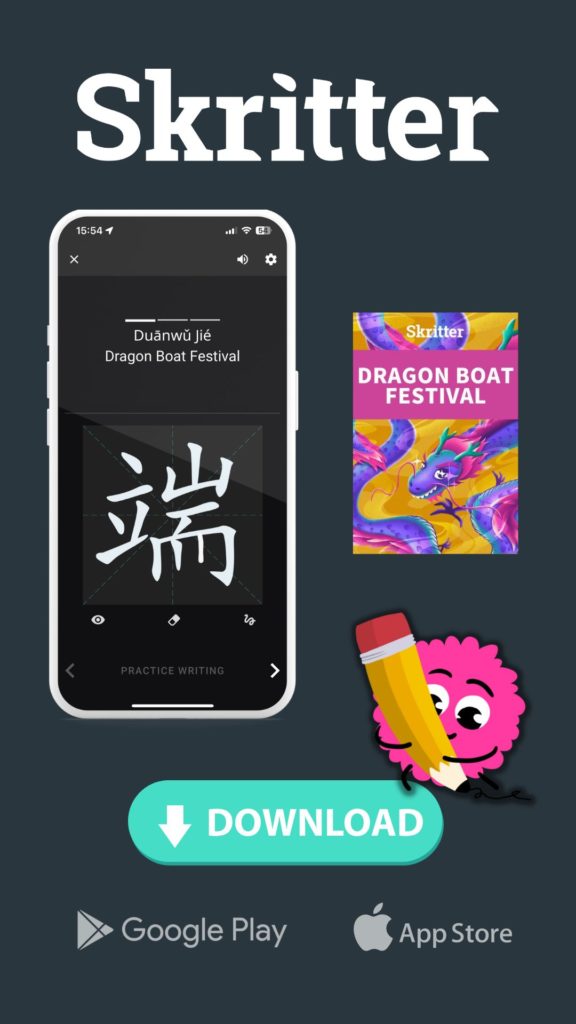![]()
![]() Happy Dragon Boat Festival. 端午节/ 端午節 Duānwǔ jié, is a traditional Chinese holiday that is celebrated on the fifth day of the fifth lunar month. Check out the video above, the blog post below, and study the flashcard deck on Skritter.
Happy Dragon Boat Festival. 端午节/ 端午節 Duānwǔ jié, is a traditional Chinese holiday that is celebrated on the fifth day of the fifth lunar month. Check out the video above, the blog post below, and study the flashcard deck on Skritter.
The Origins and Legend:
The Dragon Boat Festival traces its roots back over 2,000 years to ancient China. Legend has it that the festival honors the memory of Qu Yuan (屈原), a renowned poet and statesman during the Warring States period. Devoted to his country, Qu Yuan was deeply saddened by its decline and eventual invasion. In despair, he drowned himself in the Miluo River. Distraught locals scattered rice into the river to prevent fish from devouring his body, and they beat drums to scare away evil spirits.
Race Day Excitement:
One of the most anticipated aspects of the Dragon Boat Festival is undoubtedly the exhilarating dragon boat races. These spirited competitions involve teams of rowers paddling long, narrow boats, intricately designed to resemble fierce dragons. These magnificent creatures are believed to possess the power to scare off evil spirits and ensure good luck.
While racing, the synchronized paddling and rhythmic drumming on board create an electrifying atmosphere, filled with shouts of encouragement from both participants and spectators. These races not only showcase remarkable teamwork and physical strength but also embody the spirit of unity and perseverance.
Traditional Delicacies: Zongzi and More
Food plays a vital role during the Dragon Boat Festival, with one delicacy taking center stage – the Zongzi (粽子). Zongzi is a sticky rice dumpling wrapped in bamboo leaves and filled with an array of ingredients, typically including meat, beans, nuts, and herbs. Each region in China has its own unique variation, making it a culinary adventure to relish.
Apart from Zongzi, people also indulge in other traditional treats such as salted duck eggs, rice wine, and aromatic herbal drinks like realgar wine, believed to ward off evil spirits and protect against disease. Sharing these delectable dishes symbolizes warmth, prosperity, and familial bonds.
Cultural Significance and Customs:
Beyond its thrilling races and mouthwatering treats, the Dragon Boat Festival is a time for people to reinforce their cultural heritage and ward off evil spirits. As part of the festival customs, hung on doors and windows are colorful silk threads, herbs, and leaves believed to protect homes from evil influences. It is also customary to wear colorful woven wristbands to bring good fortune and safeguard against misfortune.
Additionally, the festival often coincides with the summer solstice, signifying a transition into a new season. Many people take this opportunity to strengthen their well-being and protect themselves from illnesses. Traditions like wearing medicinal sachets and bathing in herbal water are associated with promoting good health during this time.
Conclusion:
The Dragon Boat Festival presents a remarkable window into Chinese cultural heritage, highlighting the country’s history, traditions, and the resilient spirit of its people. From the pulsating races on the rivers to the flavorful zongzi, this celebration truly captures the essence of unity, respect, and family values.


